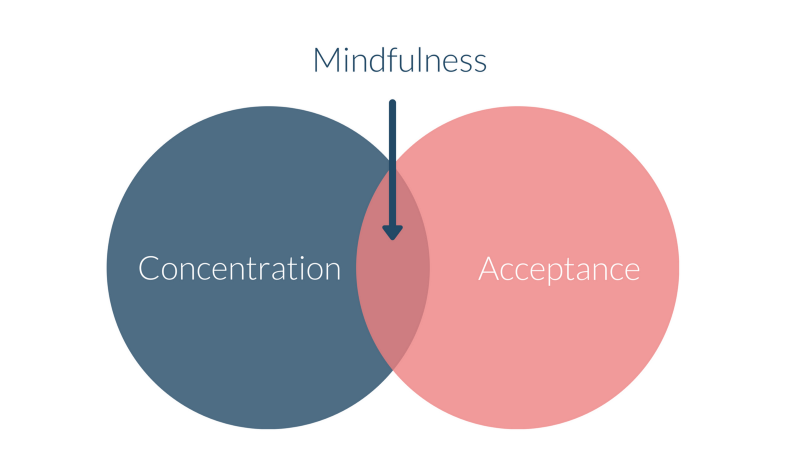The Ultimate Guide To Meditation For Anxiety
A comprehensive look at obstacles and strengths associated with meditating for anxiety.

Meditation is useful and positive because it focuses your awareness on accepting thoughts and feelings, regardless of their direction or meaning. Research has shown that practice has many benefits for anxiety. However, it's also important to acknowledge that meditating with anxiety has some common obstacles.
Experiencing racing thoughts, or some of the physical symptoms of anxiety such as shortness of breath, racing heart or headaches, can make it a lot more difficult to meditate. However, meditation can also be very effective against anxiety, as it helps you to practice safe exploration of thoughts and sit with uncomfortable feelings as well as giving you the potential to change your perspective, or your response, to anxiety.
In this ultimate guide to meditation for anxiety, we are covering:
- Why Meditating With Anxiety Can Be Hard
- Obstacles Of Meditating With Anxiety
- "Meditation Makes Me Anxious"
- Restlessness During Meditation
- Why Meditation For Anxiety Works (despite the above!)
- Three Guided Meditations For Anxiety
- Benefits Of Meditation For Anxiety
Learn to manage anxiety in only 5 minutes per day
Why Meditating With Anxiety Can Be Hard
Some people may assume that using meditation for anxiety will help to resolve their difficulties. They are mostly correct, but meditating with anxiety (i.e. experiencing anxiety when meditating) can be hard due to the complex mix of thoughts, feelings and emotions that are experienced during practice.
In order to highlight some of the issues people commonly face, let me explain the basics of mindfulness.
One of the first things people practice in mindfulness meditation is focusing on the breath. The power of the breath is something well understood these days; it's the foundation for any type of meditation. There are two main reasons for this:
- We can use the breath to reduce anxiety as diaphragmatic breathing interacts with the parasympathetic nervous system - the one that calms us down.
- The better we can focus on something (e.g. on the breath) the easier it is for us to focus on managing thoughts and emotions (e.g. during a meditative practice, or when we are informed of some negative news).
However, as powerful and important as the breath is, it's not the whole picture. Meditation is commonly misunderstood to be just sitting down and focusing, breathing slowly. However, this ignores the importance of acceptance.

Practicing non-judgmental awareness on the present moment means openly accepting whatever we experience. This includes both comfortable and uncomfortable thoughts and feelings.
This is the important bit! Meditating with anxiety is difficult because accepting negative thoughts and feelings when they are intense or overwhelming (as they often are with anxiety) is naturally difficult to do. The symptoms and descriptions of many people who describe anxiety, commonly refer to 'feeling out of control' and people find this feeling hard particularly hard to accept. This impacts our ability to meditate effectively.
Obstacles Of Meditating With Anxiety
1. Increased Self-Awareness
One key part of mindfulness is the practice of self-awareness. Coincidentally, this is also a crucial skill for dealing with emotions. You first need to notice a feeling before you can handle it properly.
However, this increased self-awareness can backfire as you become more aware of sensations in your body and the workings of your mind, you might also become more aware of your anxiety symptoms.
2. Depersonalisation Experiences
One experience that many meditators have is something called 'depersonalisation'. This means that they experience a change in their self-perception. Instead of seeing the world as they usually do, a feeling of detachment from their body and their thoughts can arise. I have also experienced this, when I was practising pranayama breathing.
There's nothing dangerous or inherently uncomfortable about depersonalization but some people do interpret this temporary change in perception very negatively (it often occurs after people experience danger or other traumatic experiences, so this makes sense).
3. Beta Brain Waves
The neurons in your brain generate electricity to communicate with each other and this electrical activity forms certain patterns. These patterns are called brain waves and come in five different forms: alpha, beta, delta, gamma, and theta.
Beta waves come with concentration, critical thinking and planning but are also associated with anxiety. Meditation practices, on the other hand, are typically associated with other types of brain waves. Transcendental meditation (TM), for example, generates alpha waves in some brain areas and that's a sign for your brain going into relaxation mode.

Not surprisingly, meditation should typically reduce beta waves. However, when people start a meditation practice, they will often drift off into thinking and planning. That's completely normal and simply part of the process. And for people who experience anxiety on a regular basis this happens even more often (because they are generally prone to repetitive thinking and negative thought spirals).
Instead of relaxing brain waves, the brain is then flooded with beta waves. It's possible - even likely - you get lost in thought for extended periods. That's why it makes sense to start with short meditation sessions (5 minutes could be a good starting point) and only increase gradually. It takes weeks and months to build up the ability to catch your mind when it's drifting off and then bring it back.
4. Emotional Upheavals
As beginner meditators slow down and watch the inner workings of their mind, repressed memories and trauma may trigger intense emotional experiences. They come to the surface as some meditation teachers would say. Panic attacks and similarly unpleasant episodes can be the result.
That's why it's important that you face traumatic memories in tiny steps and only with the help of a professional. It's hard to deal with such intense emotional experiences on your own. Mindfulness meditation is not a self-help panacea.
5. Relaxation As Anxiety Trigger
It might sound strange, but relaxation can occur as trigger during meditation for anxiety. People who experience this are able to relax... but after a short while, it's exactly this relaxation that causes them anxiety. There's even a term for this: relaxation-induced anxiety.
If you've noticed this before, it's possible that meditation also triggers anxiety for you. Instead of calming down your nervous system, it heats up. In this case, yoga (an example below) or walking meditation might be a better place to start than traditional sitting meditation.
"Meditation Makes Me Anxious"
Building on that last point, relaxation being an anxiety trigger, it's not uncommon for people to report "meditation makes me anxious". The formal phrase for this is relaxation-induced anxiety (RIA).
Relaxation induced anxiety isn't the same thing as finding traditionally relaxing things, not relaxing. As we mentioned, with RIA, you are able to relax (by any means) but it's this relaxation that triggers your anxiety. So, this means your body briefly enjoys time with the parasympathetic nervous system (relaxed state) before the trigger (relaxation) causes it to switch over to sympathetic nervous system (fight or flight) and cause symptoms of anxiety.
Restlessness During Meditation
Another common problem during meditation for anxiety is restlessness. Sometimes, people can find it difficult to reach a calm and relaxed state and even if they do, staying in it for long enough can be difficult too.
Restlessness can come from many sources and some days are worse than others. It may impact either your body, your mind or both.
Restlessness In The Body
Most people who've tried meditation will know this feeling. You sit down and after a little while you feel the urge to move. You want to get up again, you start to shift left and right, you rock back and forth.
At the same time, your heart may beat a little faster, there could be an itch in your toes or a sore in your back. It feels somehow wrong to remain still, your whole body seems to tell you that you should get up.

Restlessness In The Mind
Not only the body can be restless. The mind can be all over the place as well. Even on a normal day, there are thoughts occurring all the time. However, when you're really restless, thoughts shoot through your head left, right and centre.
Some Tips On Combating These Obstacles:
- Meditation takes practice. With time, it gets easier and some of these obstacles naturally disappear.
- Acceptance is difficult but it's the key. For example: Feel an uncomfortable knot in the stomach? It’s just a feeling, it can’t harm you. Racing heart? Same thing. Racing thoughts? Accept that your mind is racing right now. If you do that, the thoughts will continue to race but you are now practicing acceptance. The whole point is to accept, but a bonus can occur whereby as you continue to practice acceptance, the strength and intensity of such thoughts or feelings reduce naturally, as they do not carry the same weight or meaning anymore.
- Moments of observation. Observe the thoughts and sensations without reacting to them. Like a scientist, watch with curiosity what happens in your body and your mind. See if you can get interested in this experience (specifically usueful for restlessness). What does it feel like? Can you take a step back and notice without judgment? Is the experience changing?
- Exploration. What happens if you give space to the feelings? What happens if you allow your thoughts to continue without believing them? Can you experience the urge to move without reacting to it? As you use these questions to continue to attend to your moment-to-moment experience, you might discover more about yourself.
- Celebrate mini-successes. Set small goals and acknowledge your progress. You could, for example, reward yourself for meditating three days in a row.
- Mantras. Many of us go into self-deprecating mode when we feel bad but this is just another form of fighting our thoughts and feelings. To move away from harsh self-criticism and accept your current experience, these mantras can help (If those don’t resonate with you, you can just come up with your own):
“This too shall pass.”
“This is hard but I can stay with this feeling.”
“This is a moment of suffering; suffering is a part of life; may I be kind to myself and give myself what I need.”
Why Meditation For Anxiety Works
Despite the obstacles explained above, meditation for anxiety can be an extremely effective technique. It is tapping into something we are already naturally good at; being fully present in the moment.
When practised correctly, meditation, or being aware of the present moment, allows you to gain access to resources you may not have realized were with you all along. You may not be able to change your situation through meditation, but you can change your response to your situation. This awareness can have a strong calming effect on you.
You may not be able to change your situation through meditation, but you can change your response to your situation.
Essentially, meditation helps to bring calm and clarity to an overactive anxious brain. As we mentioned earlier, being able to accept racing thoughts naturally decreases their frequency over time. With the concentration focused on the present, your worries and concerns about the future or past start to mean less. Over time, meditation for anxiety changes your outlook.
Guided Meditations For Anxiety
One of the most popular meditations for anxiety, simple yet effective:
A meditation for anxiety with Yoga teacher:
Meditation for anxiety through progressive muscle relaxation:
Benefits Of Meditation For Anxiety
The benefits of practicing meditation for anxiety are widely known and well researched. And a range of studies show that it can be an effective tool for people who struggle with a variety of mental health issues. Here are the main benefits:
1. Enhanced Self-Awareness
2. Reduced Stress
3. Lengthened Attention Span
4. Improved Sleep
5. Emotional Health
6. Disposition To Kindness
7. Decreased Blood Pressure
8. Able To Fight Addictions Better
9. Able To Meditate Anywhere
If you would like to know more detail about these benefits, head on over to our previous post.
Using meditation for anxiety can be very effective. This guide has explained why meditating with anxiety can be hard, but has also offered an explanation on how to deal with that. If you're interested in learning more about anxiety, why don't you try Stresscoach for free!
Learn to manage anxiety in only 5 minutes per day
